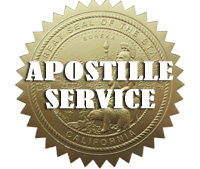Step by Step Guide: How To Become A California Notary
 There are several steps to follow to become a notary public in California. The complete process takes several months. Many of the steps to take depend on your location.
There are several steps to follow to become a notary public in California. The complete process takes several months. Many of the steps to take depend on your location.
Not all states require the same tests and fees. The details are determined by the governing laws in your area and the type of service that you plan to offer.
California is one of the states that require notary education in the form of an approved course, a notary exam, and a thorough background check.
1. Eligibility
You have to be at least 18 years old to become a California notary. There is no minimum residency.
2. Notary Exam
Take the notary public training course and examination required by the state of California. Contact the California Secretary of State office for information on classes in your county. You are required to pass California’s notary exam with a score of 70% or higher.
3. Live Scan
In order to be granted commission as notary public, applicants are required to complete a Department of Justice (DOJ) and Federal Bureau of Investigation (FBI) background check and be fingerprinted via Live Scan within one year of the exam date. If you live in the Los Angeles area, Live Scan LA provides convenient Live Scan services.
4. Application
Submit an application and required fees with the Notary Commission. State filing fees are about $40 for new and renewal commissions. A bond of $15,000 is also required. The fee will be required prior to the commission accepting your application. The application will ask for information including your name, address, contact details, age, location where you expect to do business, and any prior notary commissions you’ve worked with.
5. Oath
After the notary commission has accepted the fee, and the appropriate forms have been filed, the next step is to take an Oath of Office. The oath and bond must be filed with the county clerk’s office in the county where you plan to do business within 30 calendar days from the commencement date of the commission and may not be extended. This oath may or may not be incorporated into the filing or application process. The oath is a must and, if it is not filed, you will not be cleared to be a registered notary public. If you perform any form of notary public service without taking the oath, you could face legal consequences.
6. Notary Bond
It takes about 4-6 weeks to get your state-issued commission certificate. Once you receive it, forward a copy to the National Notary Association (NNA). You will be issued an activated notary bond. Then file your Notary Bond and Oath of Office with the county clerk.
7. Notary Supply Package
Put together a notary supply package. This should include a journal of notarial acts which is required by law, a thumb printer package, fee schedules, acknowledgment certificates, E&O policies, and other useful tools. You must have an embosser or inked stamp that has an inked impression and is reproducible on a photocopier.
8. Education
It is recommended to take specialized classes to become an expert on how to complete specific notarial tasks. The classes will depend on the types of service you plan to perform. This is not a requirement but a good investment since it will give you more versatility in your field and help increase your income.
9. Commission Term
Don’t forget to renew your commission at the end of each term which is four years.
10. Drum Up Business
Now that you are all set to start as a notary, you will need to drum up business and find customers. One of the first steps to take is to register with several of the many online notary databases around.
Please register with us, All States Notary, Inc., by filling out our notary public online sign up form. You will be considered for assignments in your area.




